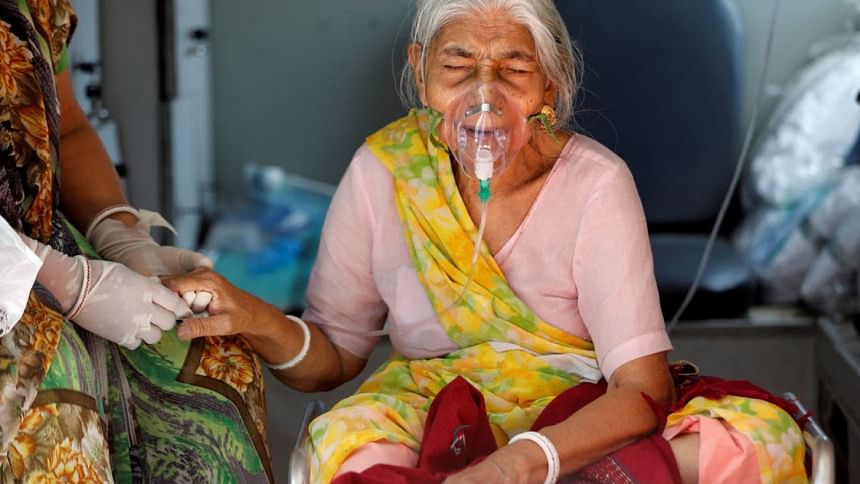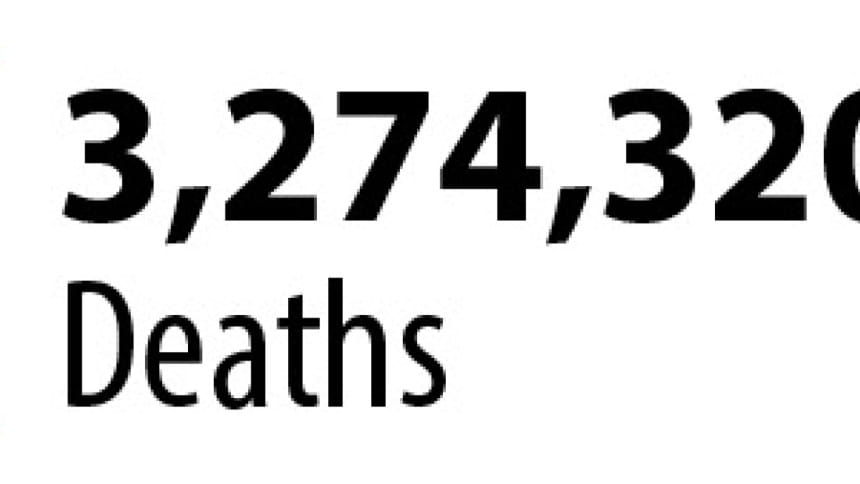India’s Covid surge to peak in coming days

A mathematical model prepared by advisers to Prime Minister Narendra Modi suggests India's coronavirus outbreak could peak in the coming days, but the group's projections have been changing and were wrong last month.
The projection comes as the World Health Organization yesterday approved China's state-owned drugmaker Sinopharm's vaccine for emergency use, a boost to Beijing's push for a big role in inoculating the world.
The vaccine, one of two main Chinese coronavirus vaccines that collectively have already been given to hundreds of millions of people in China and elsewhere, is the first developed by a non-Western country to win WHO backing. It is also the first time the WHO has given emergency use approval to a Chinese vaccine for any infectious disease.
India yesterday reported another record daily rise in coronavirus cases, 414,188, bringing total new cases for the week to 1.57 million. Deaths from Covid-19 rose by 3,915 to 234,083.
Experts said the reported figures likely underplay the real toll because the nation's crematoriums and hospitals have been overwhelmed. That makes the assessment of any peak particularly complicated.
Still, estimates may become crucial because PM Modi has been avoiding a national lockdown, choosing instead to allow states to implement their own restrictions to curb the spread.
"Our predictions are that the peak will come within a few days," Mathukumalli Vidyasagar, professor at the Indian Institute of Technology in Hyderabad, said by email Thursday, referring to a model prepared with Manindra Agrawal, a professor from IIT Kanpur.
"As per current projections, we should hit 20,000 cases per day by the end of June. We will revise this as needed."
In April, Vidyasagar's team wrongly predicted that the wave would peak by the middle of last month. That was due to incorrect parameters as "the pandemic was changing rapidly, even wildly, until about a week ago," he wrote on Twitter at the time.
More recently, Vidyasagar, also head of a government-appointed group of scientists modelling the trajectory of infections, told Reuters that the peak would be between May 3-5, and then the India Today publication that it would come on May 7.
Scientists are largely agreed that the coming few weeks will be difficult for India. A team at the Indian Institute of Science in Bangalore used a mathematical model to predict about 404,000 deaths will occur by June 11 if current trends continue. India's death toll from the pandemic has already crossed 200,000.
Meanwhile, K Vijay Raghavan, principal scientific advisor to centre, said yesterday, "If we take strong measures, the third wave may not happen in all the places or indeed anywhere at all. It depends much on how effectively the guidance is implemented at the local level, in the states, in districts and in the cities everywhere."
However, India's main opposition leader Rahul Gandhi yesterday warned that unless the deadly second wave sweeping the country was brought under control it would decimate India as well as threaten the rest of the world.
Meanwhile tonnes of medical equipment from abroad has starting to arrive in Delhi hospitals, in what could ease the pressure on an overburdened system.
NEPAL'S CASES SKYROCKET
In neighbouring Nepal, health workers and authorities are struggling to contain a massive surge of Covid-19 cases as infections spill over from India's deadly second wave.
In last three weeks, Nepal's daily case trajectory has shot up with two out of five people tested now returning positive. On Thursday, Nepal reported 8,970 cases, the highest single day increase.
More than 3,500 people have died since the pandemic began, 400 of them in the last two weeks alone, according to official figures.
"Health facilities have been flooded with symptomatic cases... The situation could become worse in the coming days," Hemanta Chandra Ojha at Nepal's Epidemiology and Disease Control Division told AFP.
British health officials yesterday labelled a coronavirus variant first found in India a "variant of concern" due to evidence it spreads more easily, with Prime Minister Boris Johnson saying the situation needed careful handling.
Public Health England (PHE) designated variant B.1.617.2, one of three variants identified in India that has spread to Britain, a variant of concern. Surge testing was being carried out in areas where evidence indicates community spread.
Australia will lift a ban on its citizens returning from Covid-ravaged India next week, Australian Prime Minister Scott Morrison said yesterday, as state officials reported that an outbreak in Sydney appeared to be contained.
Meanwhile, Japan yesterday extended a state of emergency in Tokyo and three other areas until the end of May to stem a surge in cases, but Prime Minister Yoshihide Suga reiterated that it is still possible to host Tokyo Olympics this summer.


 For all latest news, follow The Daily Star's Google News channel.
For all latest news, follow The Daily Star's Google News channel. 



Comments